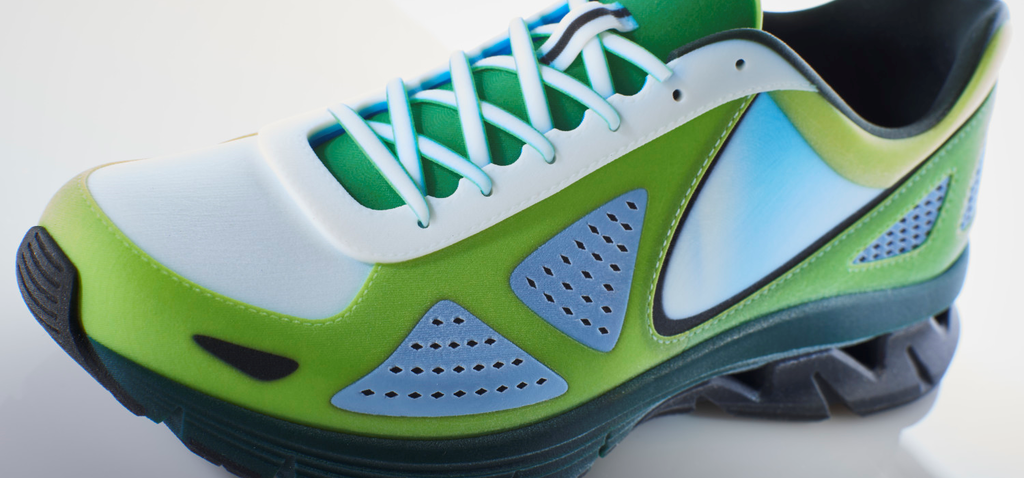Stratasys Ltd. (Nasdaq: SSYS) shared the results of a study commissioned by the Additive Manufacturer Green Trade Association (AMGTA), that demonstrates the environmental benefits of additive manufacturing for the fashion industry.
“Producing sustainably is becoming increasingly crucial for designers in the world of luxury, and this is particularly relevant for Dyloan Bond Factory a Pattern Group Company as well”
The report, “Comparative Analysis: 3D Material Jetting vs Traditional Methods for Designer Luxury Goods,” presents results of a year-long collaboration between AMGTA, Stratasys, and the DYLOAN Bond Factory, a Pattern Group company – the first Italian hub of luxury fashion design and production. An executive summary can be found here.
The use case involved the modeling of the transition from traditional manufacturing methods to advanced Additive Manufacturing to create 16,000 units of a logo applique for 8,000 pairs of luxury designer shoes, printed on fabric, produced by the innovative Stratasys J850™ Fashion TechStyle™ printer. The analysis and results of the study revealed:
- Additive manufacturing print-to-textile production process cuts CO2e emissions by 24.8%, when compared with customer’s traditional processes.
- When accounting for customer scope of production (16,000 printed logos, for 8,000 pairs of shoes), additive manufacturing can save almost one metric ton of CO2e.
- AM Print-to-textile saves 49.9% of stock material across the supply chain, reducing and streamlining transportation needs.
- AM print-to-textile with the J850™ TechStyle™ is a water-less process across the measured supply chain, potentially saving over 300,000 liters of water.
- Additive Manufacturing cuts electrical energy consumption by over 64%.
- Shift to AM reduces supply chain dependencies from 4 technologies to 1: with a single additive workflow (transportation and logistics are omitted for 3 processes).
- The shift optimizes production and logistical ‘stages’ from 12 to 2.
The research was conducted by Reeves Insight, peer reviewed by ACAM Aachen Center for Additive Manufacturing GmbH.
“Producing sustainably is becoming increasingly crucial for designers in the world of luxury, and this is particularly relevant for Dyloan Bond Factory a Pattern Group Company as well,” said Loreto Di Rienzo, R&D Director at the Pattern Group. “Stratasys’ innovation in 3D printing with the TechStyle™ technology enables us to offer revolutionary capabilities by reducing waste, minimizing reliance on natural resources and optimizing the environmental impact of our entire supply chain.”
Di Rienzo related to the AMGTA Lifecycle research, saying, “As revealed in the report on ‘Comparative Analysis: 3D Material Jetting vs Traditional Methods for Designer Luxury Goods’ in which Stratasys and Dyloan Bond Factory collaborated, we can affirm and demonstrate that additive technology truly improves our environmental impact while expanding design freedom without compromising the quality of the end result.”
Sherri Monroe, Executive Director of the AMGTA commented, “We are pleased to issue the third body of research in a series of papers designed to reveal the environmental benefits of additive manufacturing adoption. We are committed to advancing the research and publication required to better understand the sustainable value of AM technologies as part of the manufacturing cycle for broad business cases. The Stratasys-Dyloan Bond Factory Fashion LifeCycle Analysis (LCA), assessing print-to-textile, is our first polymer undertaking. It delivers important data that supports the value of AM to impact one of the most polluting industries in the world.”
This report showcases the Stratasys commitment to Mindful Manufacturing™, an approach that champions sustainability, efficiency, and innovation to 3D Print a Better Tomorrow™. Environmental concerns are paramount and can have a real impact on business results. Together with its customers, Stratasys is rethinking how things are made; redesigning processes, products and parts; and optimizing operations to the benefit of people and the planet.
“Our Mindful Manufacturing™ approach is a commitment to our customers,” said Dr. Yoav Zeif, CEO at Stratasys. “By embracing sustainable practices and innovative AM technologies, we’re working to reduce global carbon footprints – our own and our users. This study showcases how the adoption of our advanced AM offering empowers customers to deliver manufacturing solutions that improve their impact on the environment and at the same time deliver competitive advantage through innovation in production for design.”
Subscribe to AM Chronicle Newsletter to stay connected: https://bit.ly/3fBZ1mP
Follow us on LinkedIn: https://bit.ly/3IjhrFq
Visit for more interesting content on additive manufacturing: https://amchronicle.com


